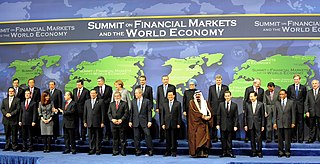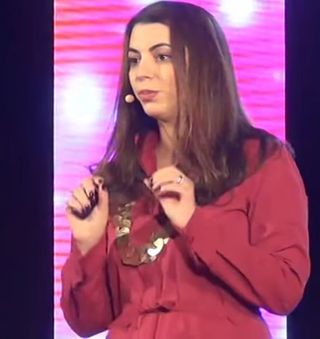
Marek Marian Belka is a Polish professor of economics and politician who has served as Prime Minister of Poland and Finance Minister of Poland in two governments. He is a former Director of the International Monetary Fund's (IMF) European Department and former Head of Narodowy Bank Polski. He has served as a Member of the European Parliament (MEP) since July 2019.
The Commission for Africa, also known as the Blair Commission for Africa, was an initiative established by the British government to examine and provide impetus for development in Africa. Initiated in Spring 2004, its objectives include the generation of new ideas for development and to deliver implementation of existing international commitments towards Africa. African leaders form a majority of the 17 commissioners.

The G20 or Group of 20 is an intergovernmental forum comprising 19 sovereign countries, the European Union (EU), and the African Union (AU). It works to address major issues related to the global economy, such as international financial stability, climate change mitigation and sustainable development.

Ngozi Okonjo-Iweala is a Nigerian-American economist, who has been serving as the Director-General of the World Trade Organization since March 2021. Notably, she is the first woman and first African to lead the World Trade Organization as Director-General. She sits on the boards of Danone, Standard Chartered Bank, MINDS: Mandela Institute for Development Studies, Carnegie Endowment for International Peace, Georgetown Institute for Women, Peace and Security, One Campaign, GAVI: Global Alliance for Vaccines and Immunization, Rockefeller Foundation, R4D: Results for Development, ARC: African Risk Capacity and Earthshot Prize plus others. She also previously sat on the Twitter Board of Directors, and stepped down in February 2021 in connection with her appointment as Director-General of the World Trade Organization.

Tharman Shanmugaratnam, also known mononymously as Tharman, is a Singaporean politician and economist who has served as the ninth president of Singapore since 2023.
Camfed is an international non-governmental, non-profit organization founded in 1993 whose mission is to eradicate poverty in Africa through the education of girls and the empowerment of young women. Camfed programs operate in Zimbabwe, Zambia, Ghana, Tanzania and Malawi.

Mahmoud Mohieldin, is an economist with more than 30 years of experience in international finance and development. He is the UN Climate Change High-Level Champion for Egypt. He is an Executive Director at the International Monetary Fund. He has been the United Nations Special Envoy on Financing the 2030 Sustainable Development Agenda since February 2020. He was the Minister of Investment of Egypt from 2004-2010, and most recently, served as the World Bank Group Senior Vice President for the 2030 Development Agenda, United Nations Relations and Partnerships. His roles at the World Bank also included Managing Director, responsible for Human Development, Sustainable Development, Poverty Reduction and Economic Management, Finance and Private Sector Development, and the World Bank Institute; World Bank President's Special Envoy on the Millennium Development Goals (MDGs), the Post-2015 Development Agenda, and Financing for Development; and Corporate Secretary and Executive Secretary to the Development Committee of the World Bank Group's Board of Governors. Dr Mohieldin also served on several Boards of Directors in the Central Bank of Egypt and the corporate sector. He was a member of the Commission on Growth and Development and was selected for the Young Global Leader of the World Economic Forum in 2005. His professional experience extends into the academic arena as a Professor of Economics and Finance at the Faculty of Economics and Political Science, Cairo University and as a Visiting Professor at several renowned Universities in Egypt, Korea, the UAE, the UK and the USA. He is a member of the International Advisory Board of Durham University Business School. He also holds leading positions in national, regional and international research centres and associations. He has authored numerous publications and articles in leading journals in the fields of economics, finance and development.

Avinash D. Persaud is emeritus Professor of Gresham College in the UK. He was Chairman of Intelligence Capital Ltd., a company specializing in analyzing, managing and creating financial liquidity in investment projects and portfolios. He was also the non-Executive Chairman of the London-based Elara Capital, an investment bank. Persaud was a Non-resident Senior Fellow of the Peterson Institute of International Economics, Executive Fellow of London Business School and Senior Fellow with the Caribbean Policy Research Institute and Head of its Barbados office.
Kingsley Y. Amoako is a Ghanaian international civil servant with a five-decade career in African development. He is a thought leader on policies and initiatives of governance and growth on the continent, and he has worked alongside development specialists to address African and global development issues.

The 2008 G20 Washington Summit on Financial Markets and the World Economy took place on November 14–15, 2008, in Washington, D.C., United States. It achieved general agreement amongst the G20 on how to cooperate in key areas so as to strengthen economic growth, deal with the 2008 financial crisis, and lay the foundation for reform to avoid similar crises in the future. The Summit resulted from an initiative by the French and European Union President, Nicolas Sarkozy, Australian Prime Minister Kevin Rudd, and the British Prime Minister, Gordon Brown. In connection with the G7 finance ministers on October 11, 2008, United States President George W. Bush stated that the next meeting of the G20 would be important in finding solutions to the economic crisis. Since many economists and politicians called for a new Bretton Woods system to overhaul the world's financial structure, the meeting has sometimes been described by the media as Bretton Woods II.

CIVETS is an acronym for six emerging market countries identified for their rapid economic development: Colombia, Indonesia, Vietnam, Egypt, Turkey, and South Africa. The term was coined in 2009 by Robert Ward of the Economist Intelligence Unit to describe nations demonstrating particularly strong growth potential. Common characteristics include "diverse and dynamic" economies, "young, growing population[s]", and "relatively sophisticated financial systems".
The UNESCO Institute for Statistics (UIS) is the statistical office of UNESCO and is the UN depository for cross-nationally comparable statistics on education, science and technology, culture, and communication.
United Nations Secretary-General Ban Ki-Moon established a High-Level Advisory Group on Climate Change Financing (AGF) on 12 February 2010 for the duration of ten months. The group's aim was to "study potential sources of revenue that will enable achievement of the level of climate change financing that was promised during the United Nations Climate Change Conference in Copenhagen in December 2009."

Amara M. Konneh is a Liberian national who serves as a senior advisor for Africa for the World Bank. In this role, he advises the World Bank on regional economic integration to create economic hubs for value chains and helps build strategic partnerships with Africa's regional economic commissions. Prior to that, he served as lead advisor for the Bank's engagements in countries affected by fragility, conflict, violence, and forced displacement with emphasis on Ethiopia, Eritrea, Kenya, and Nigeria.

The Sustainable Development Goals (SDGs) or Global Goals are a collection of seventeen interlinked objectives designed to serve as a "shared blueprint for peace and prosperity for people and the planet, now and into the future." The short titles of the 17 SDGs are: No poverty, Zero hunger, Good health and well-being, Quality education, Gender equality, Clean water and sanitation, Affordable and clean energy, Decent work and economic growth, Industry, innovation and infrastructure, Reduced inequalities, Sustainable cities and communities, Responsible consumption and production, Climate action, Life below water, Life on land, Peace, justice, and strong institutions, and Partnerships for the goals.

Amel Karboul is a Tunisian author, speaker, politician, philanthropist, and business leader. Karboul was the first woman in history to occupy Tunisia's Minister of Tourism position as the youngest member of the Mehdi Jomaa government from January 2014 to February 2015.

The 2017 G20 Hamburg summit was the twelfth meeting of the Group of Twenty (G20), which was held on 7–8 July 2017, at Hamburg Messe, in the city of Hamburg, Germany.

Sustainable Development Goal 4 is about quality education and is among the 17 Sustainable Development Goals established by the United Nations in September 2015. The full title of SDG 4 is "Ensure inclusive and equitable quality education and promote lifelong learning opportunities for all".

Sustainable Development Goals and Nigeria is about how Nigeria is implementing the Sustainable Development Goals within the thirty-six states and its Federal Capital Territory (FCT). The Sustainable Development Goals (SDGs) consist of seventeen global goals designed as a "blueprint to achieve a better and more sustainable future for all". Each of the 17 goals is expected to be achieved by 2030 in every country around the world.
Sustainable Development Goals and Lebanon explains major contributions launched in Lebanon towards the advancement of the Sustainable Development Goals SDGs and the 2030 agenda.

















